India Needs To Invest In Tyre Testing And Labelling Infra: Apollo Tyres CTO
- By Sharad P Matade
- June 22, 2021
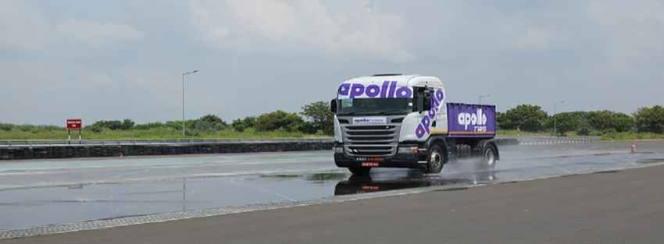
The Gurgaon-based tyre major has received accreditation for the wet grip and coast by noise tyre tests on the track. It has already been aggressive in the European market with two manufacturing plants and one R&D centre. With investments, Apollo Tyres is ramping up its testing capabilities to develop tyres for across the segments, including premium passenger, commercial vehicles, high-end motorcycles and off-highway tyres. “The tyre manufacturers are depending on the international labs for advanced characterisation and labelling tests specific to tyres. Thus, investment in both advanced tyre testing as well as labelling infrastructure is needed in this country for quick product development, not only for compliance to latest Indian regulations but also to meet the stringent regulations in other countries and thereby promoting tyre export,” says Daniele Lorenzetti, Chief Technology Officer, Apollo Tyres Ltd in an interview with Motoring Trends.
 Last month, Apollo Tyres became the first Indian tyre manufacturer to get the coveted accreditation from NABL for outdoor labelling tests in India. The company has now been accredited with ISO/IEC 17025 for the wet grip and coast by noise tyre tests on the track. This accreditation is extended for testing different tyre categories for vehicles such as passenger, light truck, commercial (C1, C2 & C3) classes, farm and motorcycle. This testing capability is linked to the Indian government’s plan to implement the ‘Star Rating’ of tyres, in line with the tyre labelling regulation in Europe.
Last month, Apollo Tyres became the first Indian tyre manufacturer to get the coveted accreditation from NABL for outdoor labelling tests in India. The company has now been accredited with ISO/IEC 17025 for the wet grip and coast by noise tyre tests on the track. This accreditation is extended for testing different tyre categories for vehicles such as passenger, light truck, commercial (C1, C2 & C3) classes, farm and motorcycle. This testing capability is linked to the Indian government’s plan to implement the ‘Star Rating’ of tyres, in line with the tyre labelling regulation in Europe.
According to Daniele Lorenzetti, Chief Technology Officer, Apollo Tyres Ltd, the growing focus of the automobile manufacturers on fuel efficiency, higher performance on ride and comfort, and safety is fuelling demand for more tyre component level testing. “Light-weighting in automobiles can alter transfer path for noise and vibration into the cabin, calling for corresponding modification in tyre design. Along with the introduction of AIS 142 standard, similar to EU R117 for labelling of the tyre, huge outdoor testing infrastructure is required, especially in proving grounds,” said Lorenzetti.
Electric Vehicle (EV) related challenges of higher weight, NVH concern, higher torque requirement and subsequent wear rate and battery life would be substantial concerns to tackle during the development process, stated the Apollo Tyres executive. “Similarly, for reducing the number of physical tests, simulation and modal development need to be evolved. Adequate testing infrastructure for validation of simulation and advanced characterisation is also simultaneously required. Hence, more indoor advanced testing infrastructure is required for NVH (Noise, Vibration and Harshness), F&M (Force and Moment) and traction performance validation,” added Lorenzetti.
Today, safety and convenience features are not limited to premium vehicles but are also provided in mid-level and entry-level vehicles, and the same trend is evident in India. Hence, while increasing capability, testing capacity also needs to be enhanced, thinks Lorenzetti.
Indian tyre manufacturers and testing services have basic levels of testing capacity such as safety requirements, durability, braking strength and dimensions. With the Indian government’s NATRIP (National Automotive Testing and R&D Infrastructure Project), vehicle and component level testing facilities have improved. “The tyre manufacturers are depending on the international labs for advanced characterisation and labelling tests specific to tyres. Thus, investment in both advanced tyre testing and labelling infrastructure is needed in this country for quick product development, not only for compliance to latest Indian regulations but also to meet the stringent regulations in other countries and thereby promote tyre export,” explained Lorenzetti.
Like the automobile industry, the tyre industry’s evolution at a broader level depends on economic, social, cultural, technological and climatic changes. The Indian tyre Industry is also evolving with the Indian macro-economic growth, advancements in technology, increasing emphasis on sustainable environmental practices and policy, and institutional and regulatory requirements.
Currently, the tyre industry is going through a highly challenging period, with lockdowns across Indian states owing to the second wave of the Covid-19 pandemic. While this impacts the demand side, pressure on the margin front is also felt due to the rising raw material prices.
 However, with the Indian government’s reinvigorated policies and programmes such as “Atmanirbhar Bharat”, localisation push, EV subsidy, economic stimulus package to thwart pandemic crisis and vehicle scrappage policy, the automotive industry in India is poised to grow at a higher trajectory. “Shift in customer preference to private vehicles from public transport and shared mobility owing to Covid might also generate an uptick. We are optimistic with the and its positive effect on the tyre industry,” said Lorenzetti.
However, with the Indian government’s reinvigorated policies and programmes such as “Atmanirbhar Bharat”, localisation push, EV subsidy, economic stimulus package to thwart pandemic crisis and vehicle scrappage policy, the automotive industry in India is poised to grow at a higher trajectory. “Shift in customer preference to private vehicles from public transport and shared mobility owing to Covid might also generate an uptick. We are optimistic with the and its positive effect on the tyre industry,” said Lorenzetti.
Tyre technology is also evolving in tandem with the automobile industry to pursue higher fuel efficiency, higher performance, driver safety, vehicle stability, light-weighting and heavy load carrying capacity. Additional advanced features such as vehicle connectivity and electrification of functions are also taking place at OEMs, which calls for intelligent talking tyres.
“Unlike in the past, the Indian vehicle market is now fast evolving. Earlier, customers had very few variants/choices available. Now, many models are introduced that call for higher bandwidth of resources. The premium segment is also poised for faster growth, and so comfort, without compromise on traction and durability, is added into the performance requirement list for tyres,” said Lorenzetti.
Indian government’s policies and regulations for sustainable growth are now major drivers for evolution in India. It has already issued a draft notification proposing new tyre norms as a part of the Automotive Indian Standards (AIS) 142:2019. The proposal states that tyres of all cars, buses and trucks shall meet the requirements of rolling resistance, wet grip and rolling sound emissions, in line with the limits of the European regulations.
 Virtual testing is also gaining traction in the auto industry as it saves development time and money and gives flexibility to engineers. Global launches, stiff competition, legal compliance to emissions, demand for more electrification and self-driven vehicles push the development process shorter than ever. The time available for development is becoming shorter and shorter. At the same time, the demands set for the characteristics of a car are becoming increasingly stringent, as is the bandwidth required for various models and variants of vehicles. So, virtual proving is the key to faster product development while tackling tyre testing capacity constraints.
Virtual testing is also gaining traction in the auto industry as it saves development time and money and gives flexibility to engineers. Global launches, stiff competition, legal compliance to emissions, demand for more electrification and self-driven vehicles push the development process shorter than ever. The time available for development is becoming shorter and shorter. At the same time, the demands set for the characteristics of a car are becoming increasingly stringent, as is the bandwidth required for various models and variants of vehicles. So, virtual proving is the key to faster product development while tackling tyre testing capacity constraints.
“However, simulation is as good as its verification and validation. Verification is the process of determining that a model implementation and its associated data accurately represent the developer’s conceptual description and specifications. Validation is the process of determining the degree to which a simulation model and its associated data are an accurate representation of the real world from the perspective of the intended uses of the model. Hence, adequate characterisation testing capability is also simultaneously required for wide-spread application of simulation,” said the CTO of Apollo Tyres.
Apollo Tyres is an Indian company that has been expanding aggressively in the European market. Today, the company has seven manufacturing plants – five in India and two in Europe (Hungary and the Netherlands).
Being a preferred partner for global OEMs, Apollo Tyres is continuously enhancing testing capabilities at its state-of-the-art R&D centres. With the two global R&D centres at Chennai, India and Enschede, Netherlands, the company aims to meet discerning OEM needs. “With the synergies between the two R&D centres, and its advanced testing capabilities, we continuously develop winning products and new technologies while also being at the forefront of meeting new regulatory requirements,” said Lorenzetti.
 The company’s extensive investments in tyre testing not only help it in developing tyres for premium luxury passenger and commercial vehicles but also high-end motorcycles and off-highway tyres (OHT). “At our R&D centre, characterisation capabilities are continuously developed for the determination of traction, NVH, F&M, ride and handling, comfort, tread wear, fuel efficiency, durability and footprint,” added Lorenzetti.
The company’s extensive investments in tyre testing not only help it in developing tyres for premium luxury passenger and commercial vehicles but also high-end motorcycles and off-highway tyres (OHT). “At our R&D centre, characterisation capabilities are continuously developed for the determination of traction, NVH, F&M, ride and handling, comfort, tread wear, fuel efficiency, durability and footprint,” added Lorenzetti.
Automotive test centres with large proving grounds funded by the Indian government are already evolved in India. Its NATRIP project aims to create core global competencies in the automotive sector in India by facilitating seamless integration of the Indian automotive industry with the world through setting up of state-of-the-art automotive testing, homologation and R&D infrastructure facilities.
Collaborations at various levels are also taking place to further enhance the vehicle test centres to tyre-specific test facilities. Earlier, Apollo collaborated with one of the test centres of the Indian government to pioneer the indigenisation of tyre labelling and certification tests in India. Similar collaboration would be beneficial for the industry to evolve faster.
“While large vehicle OEMs have their own limited proving grounds, the massive investment and maintenance requirement for this kind of infrastructure may be challenging for tyre companies to set up. Though collaboration among leading tyre companies would be a welcome scenario, the scale and size of the industry need to be evolved for such a tie-up,” said Lorenzetti.
The EV segment brings its own challenges with the higher weight of vehicles, NVH concern due to fewer and lesser noisy components, higher torque requirement and subsequent wear rate, and battery life. Apollo Tyres is gearing up for the same with capital intensive testing facilities such as “flat track” for traction, F&M tests and hemi-anechoic chamber for NVH tests. Apollo Tyres’ test machines are specially designed with multiple features, such as the very high torque ramp-up rate to match the futuristic EV requirements.
“It is heartening to note that major premium OEMs wholeheartedly partner with Apollo Tyres for joint development of products, featuring advanced technologies and engineering. We are committed in our endeavour to be the trusted partner for our esteemed customers and society at large by enhancing value with best-in-class efficiency through sustainable models for environment conservation,” said Lorenzetti. (MT)

Motul Extends Partnership With Caterham, Becomes Title Sponsor For 2026 Championship
- By MT Bureau
- February 05, 2026
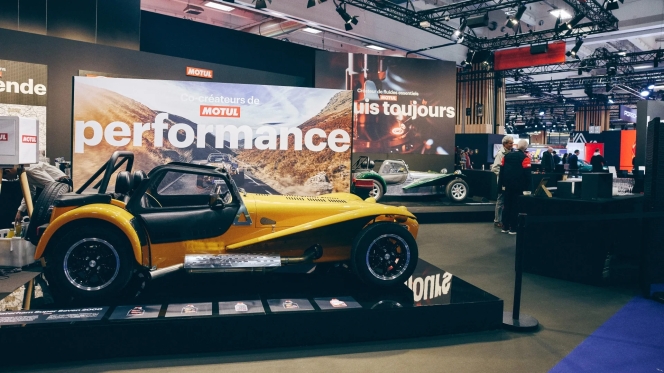
Caterham and Motul have solidified their ongoing collaboration with a new long-term agreement, blending Caterham’s focus on lightweight sports cars with Motul’s extensive expertise in advanced lubrication, honed over more than a century and a half. The alliance was celebrated publicly at Rétromobile 2026 in Paris, where a 2005 K-Series and a 2025 Super Seven 2000 were displayed on Motul’s stand. Under the renewed partnership, every new Caterham Seven produced at the company’s Dartford headquarters will leave the factory using Motul lubricants, spanning all models from the road-going 170 to each race car competing in the five Caterham Motorsport UK Championships.
Further deepening the relationship, Motul will take on the role of title sponsor for the Caterham Seven Championship UK in 2026, the brand’s premier national racing series. Known globally for its high-performance, motorsport-oriented fluid solutions, Motul brings decades of experience supporting automotive reliability and competitive success. Its technical innovation and research capabilities, proven through partnerships with major events like the 24 Hours of Le Mans and the Dakar Rally, ensure that its products meet the most demanding requirements, making Motul a natural and strategic partner for Caterham’s engineering and racing ambitions.
Ali McColl, Global Head of Marketing, Caterham, said, “This partnership is a significant milestone for Caterham, aligning our brand with a world-renowned leader in lubricants and fluid technology, reinforcing our commitment to performance across both our road and race cars. Motul brings a depth of experience in performance and efficiency that few other partners can offer. This agreement also marks an exciting new chapter for Caterham Motorsport. As we look ahead to the 2026 season, we are proud to unveil the Motul Caterham Seven Championship UK as the new name for the pinnacle of Caterham racing in the UK.”
Andreea Culcea, Chief Brand & Communication Officer, Motul, said, “We are proud to renew our partnership with Caterham, a brand renowned for its exceptional sports car expertise. Since 2019, our collaboration has been driven by shared values of performance, craft and precision. At Motul, we are developing tailor-made solutions designed to unlock the full potential of our partners’ machines. Working alongside a manufacturer like Caterham, where hand-crafted, limited-production cars are born from deep engineering know-how and passion, reflects our vision of authentic partnerships.”
- January 2026
- sales
- Hero MotoCorp
- TVS Motor Company
- Royal Enfield
- B Govindarajan
- Eicher Motors
- Mahindra & Mahindra
- Tata Motors Passenger Vehicles
- Hyundai Motor India
- Toyota Kirloskar Motor
- JSW MG Motor India
- Kia India
- Tarun Garg
- Nalinikanth Gollagunta
- Atul Sood
- Tata Motors Commercial Vehicles
Indian Automotive Sector Starts 2026 With Robust January Wholesales Growth
- By MT Bureau
- February 01, 2026

The Indian automotive industry has commenced the 2026 calendar year on a high note, with automakers across two-wheeler, passenger vehicle and commercial vehicle segments reporting significant YoY wholesale growth for January. The performance reflects a resilient domestic market and a burgeoning recovery in international exports.
The two-wheeler sector saw massive volume gains, spearheaded by Hero MotoCorp, which recorded dispatches of 557,871 units, marking a robust 26 percent growth compared to 442,873 units in January 2025. This performance marks the company’s 25th consecutive year of market leadership. TVS Motor Company followed with a 30 percent increase in domestic two-wheeler sales, reaching 383,262 units, while its electric vehicle (EV) wing grew by 50 percent to 37,756 units.
Royal Enfield achieved a significant milestone, surpassing 1 million year-to-date sales in just 10 months, posting January sales of 104,322 motorcycles – a 14 percent YoY increase, which includes 93,781 units in the domestic market and 10,541 units exported.
B. Govindarajan, Managing Director, Eicher Motors and CEO, Royal Enfield, said, "The new year has begun on a positive note for Royal Enfield – extending the strong momentum from the previous quarter and marking four consecutive months of healthy double-digit growth. We have crossed 1 million motorcycle sales in this financial year across the globe and also crossed 100,000 motorcycle sales in exports."
In the passenger vehicle (PV) segment, Mahindra & Mahindra reported a 25 percent growth in utility vehicles, selling 63,510 units domestically. Tata Motors Passenger Vehicles saw a dramatic 47.1 percent rise in total sales (including EVs) to 71,066 units.
Hyundai Motor India achieved its highest-ever monthly domestic sales of 59,107 units, up 9.5 percent, while Toyota Kirloskar Motor registered 30,630 units, representing a 17 percent YoY growth. Kia India also started the year strong with 27,603 units, a 10.3 percent increase and JSW MG Motor India grew 9 percent with 4,843 wholesale units.
Honda Cars India reported domestic wholesales of 6,193 units and 748 units in exports. These figures follow a January 2025 performance where the company registered 7,325 domestic units and 4,979 units in exports.
The current sales volume is supported by demand for the Honda Amaze, alongside steady contributions from the City and Elevate models.
Tarun Garg, MD & CEO, Hyundai Motor India, said, "January 2026 marks a defining chapter in Hyundai Motor India’s journey. Achieving our highest-ever monthly domestic sales of 59,107 units... reflects not only Hyundai’s brand leadership but also the collective strength of our people, partners and customers."
Nalinikanth Gollagunta, CEO, Automotive Division, Mahindra & Mahindra, said, "Building on the strong momentum of last year's performance, we began the year on a strong note in January... On 14th January, we opened bookings for XUV7XO and XEV 9S clocking 93,689 bookings for a booking value of INR 205 billion - a record-breaking milestone in just 4 hours."
Atul Sood, Senior Vice-President, Sales & Marketing, Kia India, said, "The encouraging start to 2026 reflects the continued trust customers place in the Kia brand. The positive response to the new-generation Seltos, steady demand for the Sonet, and growing popularity of the Carens Clavis and Clavis EV, underline the strength and balance of our portfolio."
Kunal Behl, Vice President, Marketing & Sales, Honda Cars India Ltd, said: “The year has begun on a strong note, supported by a healthy sales momentum. The Honda Amaze continues to bring in strong demand for its value for money offering along with the City and Elevate that contribute steadily to the overall business. We remain confident of sustaining this positive momentum in the coming months.”
The commercial vehicle (CV) sector also demonstrated strength, particularly in heavy and light cargo segments. Tata Motors reported total CV sales of 38,844 units, up 29.1 percent from 30,083 units in the previous year. Within this, Heavy Commercial Vehicle (HCV) trucks saw the sharpest rise at 41.2 percent. Mahindra’s domestic CV sales grew by 22 percent to 27,656 units, driven largely by the LCV 2T–3.5T category.
Union Budget 2026-27: Supply Chain Resilience, Infra Push To Drive Auto Industry Growth
- By MT Bureau
- February 01, 2026
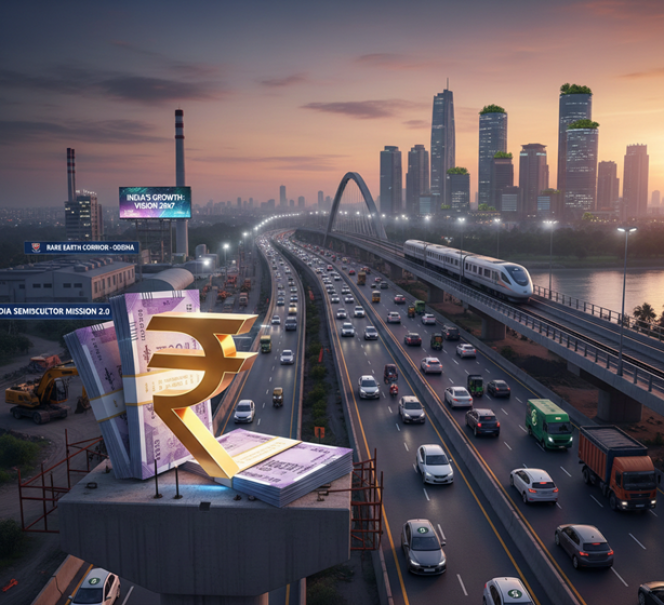
In a strategic pivot from direct consumer subsidies to foundational supply-chain resilience, the 2026-27 Union Budget, presented by Finance Minister Nirmala Sitharaman, focuses on bolstering the structural integrity of the Indian automobile industry.
A cornerstone of this year’s fiscal policy is the massive infrastructure and logistics push, highlighted by the development of the Dankuni-Surat Dedicated Freight Corridor and the operationalisation of 20 new national waterways. These initiatives, alongside a coastal cargo promotion scheme aiming to double the share of waterway freight to 12 percent by 2047, are designed to drastically lower logistics costs and ease the movement of components across the country.
Simultaneously, the government is reinforcing the industry's backbone by establishing a INR 100 billion SME Growth Fund to provide long-term capital for auto-component MSMEs, while enhancing liquidity through the Trade Receivables Discounting System (TReDS) and easing regulatory hurdles via ‘Corporate Mitras’ in Tier-II and Tier-III cities.
To secure the future of high-tech mobility, the Budget further expands the India Semiconductor Mission (ISM 2.0) to include domestic equipment manufacturing and chip IP, while nearly doubling the allocation for the Electronics Components Manufacturing Scheme to INR 400 billion. This technological drive is matched by a robust commitment to the electric vehicle (EV) ecosystem, specifically through the creation of ‘rare earth corridors’ in Odisha, Kerala, Andhra Pradesh and Tamil Nadu. These hubs will provide plug-and-play ecosystems to insulate the industry from global mineral volatility and supply curbs. Complementing this is a series of customs duty exemptions on capital goods used for lithium-ion cell manufacturing and critical mineral processing, which is expected to drive down battery costs and encourage local gigafactory expansion. Finally, for the clean energy segment, the full excise duty exemption on the biogas portion of blended CNG offers immediate relief to fuel prices, marking a comprehensive effort to foster a self-reliant, sustainable, and cost-competitive automotive landscape in the wake of previous GST reforms.
Motul Charts Future Of Mobility With Advanced Fluids At SIAT Expo 2026
- By MT Bureau
- January 31, 2026
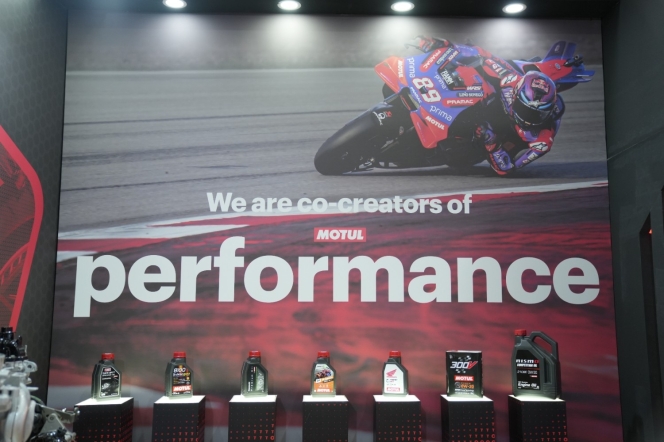
Motul India presented a comprehensive vision for the future of automotive fluids at SIAT Expo 2026, centred on innovation, sustainability and supporting the industry’s technological transition. The company’s exhibition was built around the event’s core theme of pioneering safe and sustainable mobility, demonstrating a strategic commitment to evolving alongside new vehicle architectures.
A cornerstone of this vision is the development of fluids for new propulsion systems. A keynote address by Dr Julien Plet, Global Head of R&D, elaborated on the critical role of innovative fluids for next-generation mobility. The company showcased its E-Gen series, engineered for the thermal management of electric vehicle components like motors, batteries and power electronics, positioning it as a critical solution for evolving electrified mobility. Simultaneously, for alternative fuels, Motul presented specialised lubricant formulations for hydrogen internal combustion engines, reflecting early and active research into diverse energy sources. This dual focus underscores a readiness to support the industry’s broad technological transition.
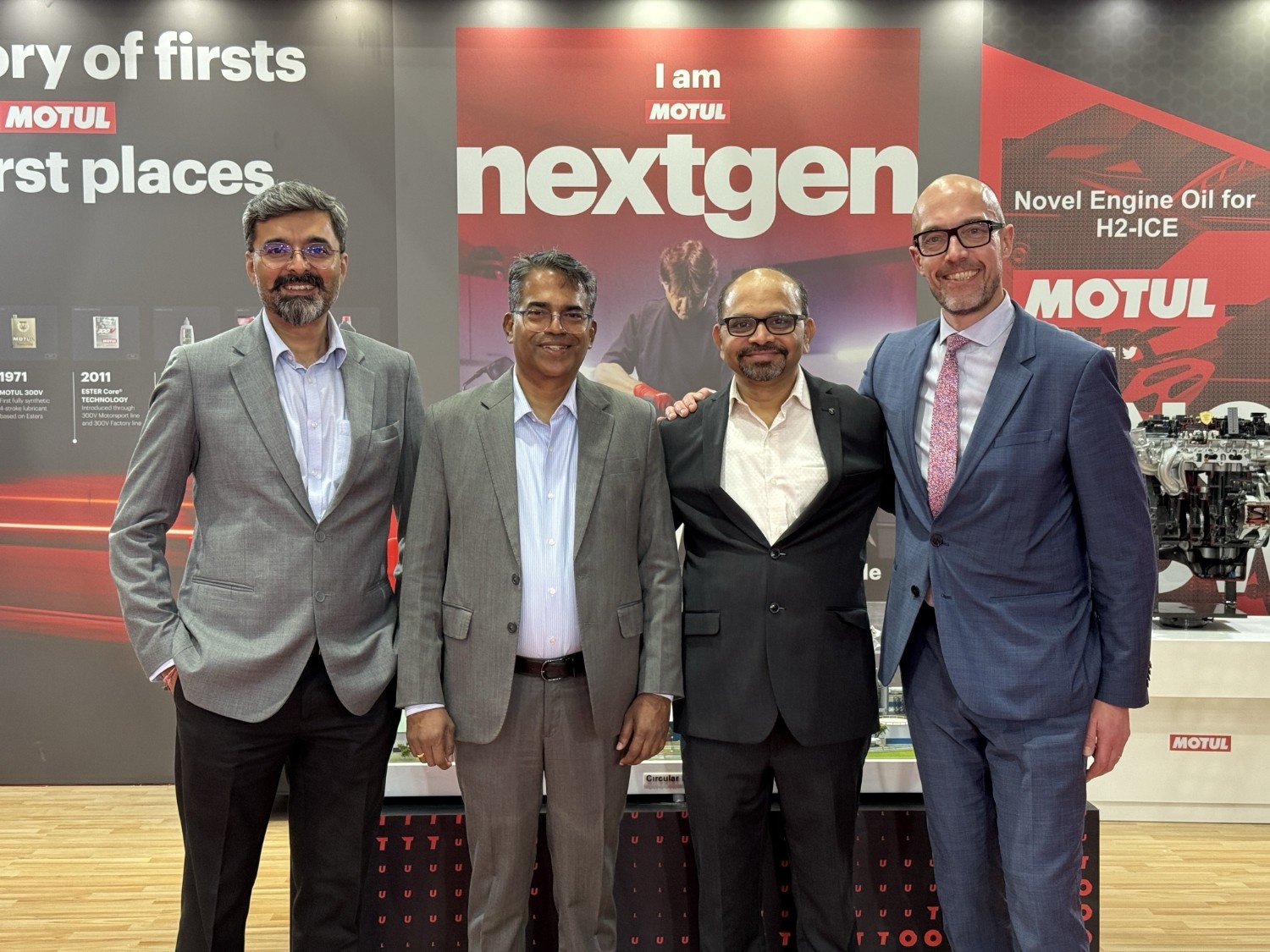
Further solidifying its technical credibility, Motul emphasised its race-to-road development philosophy. The exhibit featured OEM-validated products, including a lubricant with formal Mercedes-Benz approval and another born from collaboration with Toyota Racing Development. These examples illustrate how the company leverages the extreme demands of motorsport as a dynamic proving ground for future commercial technologies, rather than for immediate market launch.
Integral to its presentation was a strong sustainability narrative, exemplified by the NGEN lubricant range. This product line utilises base oils derived from re-refined materials, embodying circular economy principles and a long-term commitment to reducing environmental impact through responsible resource use.
Ultimately, by participating in the expo, Motul India reinforced its role as an innovation-led partner to the automotive ecosystem. With a robust global research backbone and deep industry relationships, the company showcased its structured approach to developing high-performance, sustainable fluids tailored to meet the specific demands of the Indian market as it advances.
Dr Plet said, “Motul’s research and development teams across geographies continue to focus on advancing lubricant performance for existing powertrains while developing technologies aligned with future mobility needs and local market conditions.”
Nagendra Pai, CEO, Motul India & South Asia, said, ‘’SIAT Expo is a key platform for future mobility, and Motul is proud to showcase its global innovation strength in India. By combining advanced technologies with local adaptability, Motul is ready to lead solutions across electrification, sustainability and alternative fuels.”







Comments (0)
ADD COMMENT